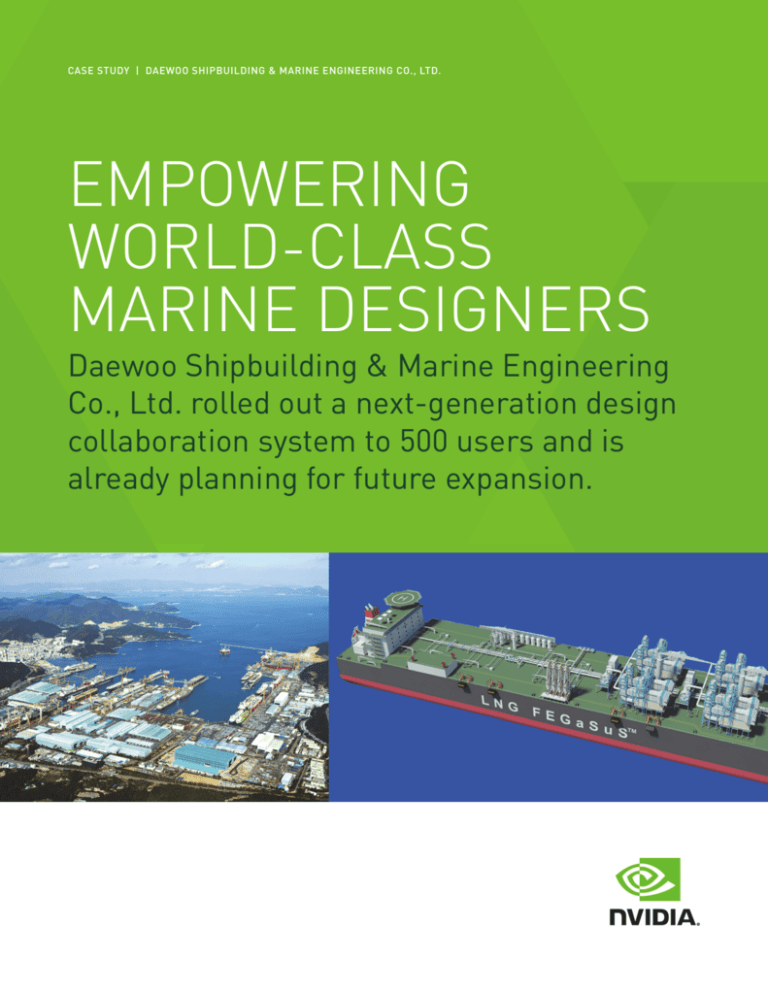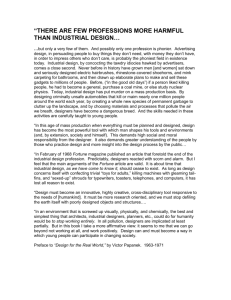
CASE STUDY | DAEWOO SHIPBUILDING & MARINE ENGINEERING CO., LTD.
EMPOWERING
WORLD-CLASS
MARINE DESIGNERS
Daewoo Shipbuilding & Marine Engineering
Co., Ltd. rolled out a next-generation design
collaboration system to 500 users and is
already planning for future expansion.
Daewoo Shipbuilding & Marine Engineering
Co., Ltd. rolled out a next-generation design
collaboration system to 500 users and is
already planning for future expansion.
AT A GLANCE
CUSTOMER PROFILE
Company: Daewoo Shipbuilding &
Marine Engineering Co., Ltd.
Industry: Marine Shipbuilding
Locations: Seoul and Geoje-si, Korea
Size: 3,000 employees
Since its establishment in 1973, Daewoo Shipbuilding & Marine
Engineering Co., Ltd. (DSME) has been building ships, offshore plants,
drill ships, Floating Production Storage & Offloading (FPSO) units,
submarines, and destroyers. DSME is aiming to become the best
shipbuilding and marine engineering company in both Korea and around
the world. The company is therefore upgrading to the latest shipbuilding
technology and developing its skills in advanced offshore platform
building and large-scale plant project management, all with the goal of
delivering top-quality civilian and military products.
SUMMARY
>Shipbuilding and marine
engineering company
CHALLENGE
>Up to 3,000 designers collaborate
on a single large project
The existing design collaboration server relied on NVIDIA Quadro 6000
GPUs. This solution efficiently handled the 2D design models used by
DSME; however, part of the overall modernization and quality effort
included migrating to 3D design models using Aveva Marine. The switch
from 2D to 3D overloaded the design collaboration server, causing
noticeable performance delays and other system issues when users
tried to work with the 3D data.
>Implementing NVIDIA GRID K2
improved productivity,
collaboration, and security
>Expanding the implementation to
cover more users
SOFTWARE
Key applications: Aveva Marine 3D
Desktop and Application Remoting:
Citrix XenDesktop and XenApp
Hypervisor: Citrix XenServer
HARDWARE
After researching their options, DSME decided to test a virtual desktop
infrastructure (VDI) using NVIDIA® GRID™ K2. A rigorous testing
program took place from June to December of 2013. This testing
program included verifying compatibility with Aveva Marine,
performance tests with multiple concurrent users, graphics resolution,
and frame rate. The goal of this extensive testing was to determine the
best way to implement the new design collaboration system.
GRID boards: K2
Servers: HP SL250
Clients: Various desktop and mobile
devices
SOLUTION
Each NVIDIA GRID K2 board is equipped with 2 Kepler-based GPUs and
3,072 NVIDIA CUDA® cores, with 8GB of GDDR5 RAM and a maximum
power consumption of 225W. DSME implemented eighteen (18) HP
SL250 servers with Intel Xeon processors and one NVIDIA GRID K2 board
per server running the Citrix XenServer hypervisor along with
CASE STUDY | DAEWOO SHIPBUILDING & MARINE ENGINEERING CO., LTD. | EMPOWERING WORLD-CLASS MARINE DESIGNERS
At DSME, a total of 3,000
designers—including 2,000
internal designers and
1,000 external vendor
designers—collaborate on
large tasks. Because many
designers are involved,
there is a strong need for
them to be able to work as
naturally as if they were
working with local PCs
when it comes to
collaborated tasks.
Through the
implementation of NVIDIA
GRID K2, the capacity for
3D CAD simultaneous
design users was
increased from merely 15
users to a maximum of 30
users.
Yoon Moon-gyeong
IT Manager
DSME
XenDesktop and XenApp to deliver the virtual desktops to individual
users.
The number of simultaneous users who could
access Aveva Marine with workstation-grade
performance instantly doubled from 15 to 30.
The first phase of the VDI rollout consisted of the extensive testing
carried out from June to December of 2013. This testing program
included a proof-of-concept phase for technical verification and user
acceptance testing, after which the NVIDIA GRID K2-based design
collaboration system rolled out to 500 users sharing the 18 HP servers.
“At DSME, a total of 3,000 designers—including 2,000 internal designers
and 1,000 external vendor designers—collaborate on large tasks,” said
Yoon Moon-gyeong, Information Technology Manager at DSME. “Because
many designers are involved, there is a strong need for them to be able
to work as naturally as if they were working with local PCs when it
comes to collaborated tasks. Through the implementation of NVIDIA
GRID K2, the capacity for 3D CAD simultaneous design users was
increased from merely 15 users to a maximum of 30 users.”
RESULTS
After implementing the new design collaboration system with NVIDIA
GRID K2, users at DSME have become more productive thanks to the
increased performance. The ability to access and share centrally-stored
data is fostering collaboration while reducing problems associated with
version control and security. Improved graphics performance allows
users to more quickly view shaded previews and renderings. They can
also conduct virtual walkthroughs and inspections of designs in
progress. External vendors can log in to review progress, provide input,
CASE STUDY | DAEWOO SHIPBUILDING & MARINE ENGINEERING CO., LTD. | EMPOWERING WORLD-CLASS MARINE DESIGNERS
5 REASONS FOR GRID
1NVIDIA GRID K2 supports twice as
many concurrent Aveva Marine
designers with full graphics
performance.
2Internal and external designers
benefit from increased
collaboration capabilities.
3Users receive workstation-grade
performance, even when working
with shaded or rendered data.
4External vendors can access the
design collaboration server to
review designs in progress.
5Designers can perform virtual
walkthroughs and inspections
Our new GRID K2-based
design collaboration
system has delivered
higher graphics
performance with more
simultaneous connections
than our previous
collaboration server.
Further, designers working
outside of the company can
easily and efficiently
access and review
preliminary designs.
and collaborate on designs. All of these benefits are contributing to
DSME’s goal of improving the quality of its products while reducing the
total cost of ownership compared to their previous infrastructure.
“At DSME, our new GRID K2-based design collaboration system has
delivered higher graphics performance with more simultaneous
connections than our previous collaboration server,” concluded Moongyeong. “This has enabled DSME to perform graphics-related tasks,
such as inserting and rotating a model, with the same performance as
on a local PC. Further, designers working outside of the company can
easily and efficiently access and review preliminary designs.”
Implementing the virtual desktop infrastructure (VDI) with NVIDIA GRID
K2 also enhanced security, because the drawings and design data
generated by each designer through the design collaboration system are
now saved to the centralized in-house server. Designers log in to the VDI
and access applications and data as needed without any of the security
or data integrity concerns inherent with storing data on personal
computers or devices.
Yoon Moon-gyeong
IT Manager
DSME
To learn more about NVIDIA GRID visit
www.nvidia.com/vdi
JOIN US ONLINE
blogs.nvidia.com
@NVIDIAGRID
gridforums.nvidia.com
tinyurl.com/gridvideos
linkedin.com/company/nvidia-grid
© 2014 NVIDIA Corporation. All rights reserved. NVIDIA, the NVIDIA logo, and NVIDIA GRID are trademarks and/or
registered trademarks of NVIDIA Corporation. All company and product names are trademarks or registered trademarks of
the respective owners with which they are associated.




